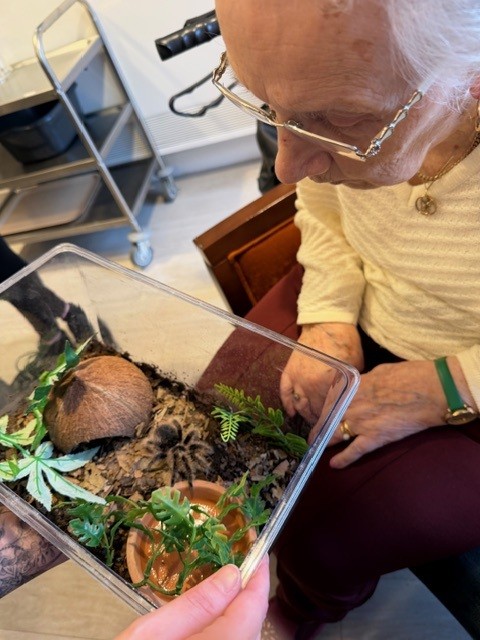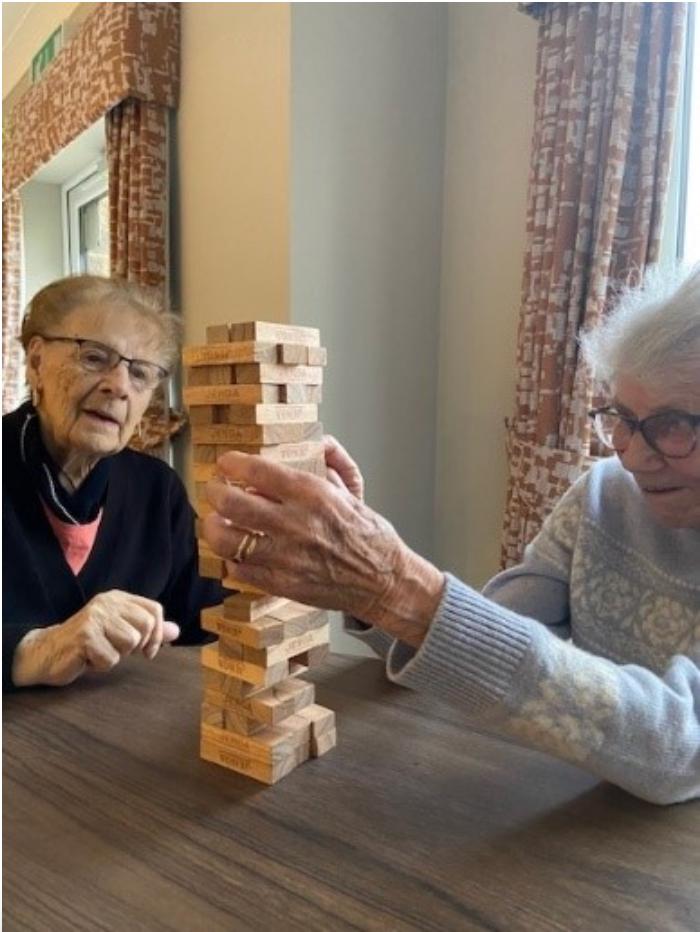Understanding Dementia: A Guide for Bedfordshire Families

Dementia is a term that encompasses a variety of conditions affecting memory, thinking, and social abilities, with Alzheimer's disease being the most prevalent. It's a diagnosis that can feel overwhelming, filled with uncertainty and a sense of loss, not just for the person living with dementia but for their family and friends as well.
Here at Penrose Court Care Home in Biggleswade, Bedfordshire, we understand the complexities of this disease and the many questions it raises. We recognise that dementia isn't just about memory loss; it's about changes in personality, behaviour, and the ability to perform daily tasks.
This guide is designed to be a resource for families in Bedfordshire who are navigating the challenges of dementia. We'll provide clear information about the different types and stages of dementia, helping you understand what to expect as the disease progresses. We'll also discuss common early warning signs, so you can seek timely diagnosis and support.
Additionally, we'll offer practical tips for caregivers, providing strategies for communication, managing difficult behaviours, and maintaining the well-being of both the person with dementia and their loved ones.
Our goal is to empower you with knowledge and resources so you can approach this journey with confidence and compassion.

What is Dementia?
Dementia isn't a single disease but an umbrella term for a collection of symptoms caused by various underlying conditions. These symptoms primarily affect cognitive function, impacting memory, thinking skills, language, judgment, and behaviour. While dementia is often associated with forgetfulness, it's important to understand that it's much more than just simple memory loss. It can disrupt a person's ability to perform daily tasks, navigate familiar environments, communicate effectively, and maintain their independence.
Although dementia primarily affects older adults, it's crucial to remember that it's not a normal part of ageing. It's a result of damage or changes in the brain caused by diseases like Alzheimer's, vascular dementia, Lewy body dementia, and frontotemporal dementia. Each type of dementia has its own unique characteristics and progression, but they all share a common thread of gradual cognitive decline.
While the prospect of dementia can be daunting, it's important to remember that there are ways to manage the symptoms and maintain the quality of life for both the person with dementia and their loved ones. Early diagnosis, access to appropriate care and support, and engagement in stimulating activities can make a significant difference.
If you have concerns about yourself or a loved one, seeking professional help is crucial for receiving an accurate diagnosis and developing a personalised care plan.

Common Types of Dementia: Understanding the Differences
Understanding the specific type of dementia your loved one is experiencing can help you anticipate their needs and provide appropriate support. Here's a brief overview of the most common types:
- Alzheimer's Disease: This is the most prevalent form of dementia, accounting for a significant majority of cases. It's characterised by the gradual buildup of abnormal proteins in the brain, leading to a decline in memory, thinking skills, and overall cognitive function. Early symptoms typically include forgetfulness, difficulty with problem-solving, and changes in mood or behaviour. As the disease progresses, individuals may experience more severe memory loss, confusion, and difficulty communicating.
- Vascular Dementia: This type of dementia is caused by reduced blood flow to the brain, often as a result of strokes or other vascular problems. The symptoms can vary depending on the area of the brain affected, but common signs include impaired judgment, difficulty with planning and organising, and changes in mood or personality. Unlike Alzheimer's, vascular dementia often progresses in a step-wise fashion, with periods of stability followed by sudden declines.
- Lewy Body Dementia: This form of dementia is characterised by the presence of Lewy bodies, abnormal protein deposits that develop in nerve cells in the brain. These deposits can affect thinking, memory, movement, behaviour, and sleep. People with Lewy body dementia may experience visual hallucinations, fluctuating cognitive abilities, and Parkinson's-like symptoms such as tremors and stiffness.
- Frontotemporal Dementia: This less common type of dementia primarily affects the frontal and temporal lobes of the brain, which are responsible for personality, behaviour, and language. Symptoms can vary depending on the specific areas affected but may include changes in social behaviour, impulsivity, apathy, and difficulty with language and communication.
While these are the most common types, it's important to note that mixed dementia, where an individual experiences a combination of different types, is also possible. An accurate diagnosis by a medical professional is essential for understanding the specific type of dementia and developing an appropriate care plan.

Early Signs: Beyond Forgetfulness
Early detection of dementia is crucial for timely diagnosis, intervention, and support. While memory loss is often the most recognised symptom, it's important to be aware that dementia can manifest in various subtle ways. Recognising these early signs can be key to seeking help and starting treatment early, potentially slowing the progression of the disease and improving quality of life.
- Memory Loss That Disrupts Daily Life: While occasional forgetfulness is a normal part of ageing, dementia-related memory loss tends to be more persistent and interfere with daily routines. This might include forgetting recent events, appointments, or conversations, repeatedly asking the same questions, or misplacing items frequently.
- Difficulty with Familiar Tasks: A person with dementia might find it increasingly challenging to complete tasks they once found easy. They may struggle to follow a familiar recipe, pay bills, or operate household appliances. This can be due to difficulty concentrating, following instructions, or remembering steps in a sequence.
- Problems with Language and Communication: Dementia can affect language skills, making it difficult for individuals to find the right words, follow conversations, or express their thoughts clearly. They may struggle with understanding written or spoken language, or have difficulty naming familiar objects.
- Disorientation in Time and Place: Feeling disoriented or confused about time and place is another common early sign of dementia. This might involve getting lost in familiar environments, forgetting dates or appointments, or being unsure of what day of the week it is.
- Changes in Mood and Behavior: Dementia can cause significant shifts in mood and personality. A person may become increasingly anxious, withdrawn, or depressed. They might also experience uncharacteristic irritability, agitation, or aggression. These changes can be distressing for both the individual and their loved ones.
- Poor Judgment and Decision-Making: Impaired judgment is another red flag. This might manifest as making impulsive or risky decisions, neglecting personal hygiene, or showing a lack of interest in activities they once enjoyed. Financial mismanagement, such as making unusual purchases or falling victim to scams, can also be a sign of cognitive decline.
If you notice any of these signs in a loved one, it's important to consult with a healthcare professional for a comprehensive assessment. Early diagnosis can lead to early intervention and support, which can make a significant difference in managing dementia and maintaining quality of life.

Stages of Dementia: A Gradual Progression
Dementia is a progressive disease, meaning it evolves over time, and its impact on cognitive abilities deepens. Understanding these stages can help you anticipate changes in your loved one's needs and adapt their care accordingly. Keep in mind that the progression of dementia is unique for each individual, and there may be variations in the speed and severity of symptoms.
Early Stage Dementia
The early stage is often characterised by subtle changes that might be mistaken for normal ageing. These can include mild forgetfulness, like misplacing keys or struggling to remember recent events. However, unlike typical age-related forgetfulness, dementia-related memory loss tends to be more persistent and interfere with daily life.
There may also be challenges with complex tasks, such as managing finances or following multi-step instructions. Despite these difficulties, individuals in the early stage of dementia can typically still function independently, maintaining their social relationships and participating in activities they enjoy.
At this stage, early diagnosis and intervention are crucial for accessing resources, developing coping strategies, and potentially slowing the progression of the disease.
Middle Stage
As dementia progresses to the middle stage, memory problems become more pronounced. Recent events may be completely forgotten, and even long-term memories may become hazy. Individuals may struggle to recognise familiar faces or places, and their ability to communicate effectively may decline. Daily activities that were once routine, like dressing, bathing, or cooking, may become increasingly difficult, requiring more support and assistance.
At this stage, it's important to create a safe and supportive environment, establish routines to minimise confusion and provide gentle reminders and cues for daily tasks. Engaging in activities that stimulate the mind and provide a sense of purpose can also be beneficial during this stage.
Late Stage
In the late stages of dementia, memory loss becomes severe, and individuals may no longer recognise loved ones or remember significant events from their past. Communication becomes increasingly difficult, and many lose the ability to speak or understand language. They may also experience difficulty walking, swallowing, and controlling bladder and bowel function.
At this stage, individuals require round-the-clock care for all aspects of daily living, including personal hygiene, nutrition, and mobility assistance. The focus shifts to ensuring comfort, and dignity, and maintaining connections through touch, music, and other sensory experiences.
While each stage presents unique challenges, it's important to remember that there are still opportunities for joy, connection, and meaningful moments throughout the dementia journey. With the right care and support, individuals with dementia can continue to live fulfilling lives, surrounded by love and understanding.

Supporting a Loved One with Dementia
Caring for someone with dementia requires patience, understanding, and a willingness to adapt as the disease progresses.
It's crucial to remember that the person with dementia is not intentionally difficult or trying to be stubborn. Their brain is undergoing changes that affect their behaviour, memory, and ability to communicate. They may forget things, become easily confused, or experience mood swings. Approach interactions with empathy and understanding, recognising that their actions are often a result of the disease, not a personal choice. Offer reassurance, avoid arguments, and focus on maintaining a positive and calm atmosphere.
As dementia progresses, it's important to create a safe and supportive environment that minimises risks. Start by removing tripping hazards like rugs or clutter, ensuring adequate lighting in hallways and rooms, and installing safety features like grab bars in the bathroom and handrails on stairs. Labelling drawers and cupboards can help with organisation and reduce confusion. Consider adding locks to doors leading outside to prevent wandering. Simple adjustments to the environment can significantly enhance safety and reduce anxiety for both the person with dementia and their caregivers.
A predictable routine can be a lifeline for someone with dementia. Stick to regular mealtimes, bedtime routines, and daily activities. This helps create a sense of normalcy and reduces the anxiety that can come with uncertainty. Use visual cues like calendars or clocks to help them keep track of time, and gently remind them of upcoming events or appointments. A consistent routine can also help regulate sleep patterns and improve overall mood.
Staying active and engaged is crucial for maintaining cognitive function and emotional well-being in those with dementia. Participate in activities they enjoy, whether it's listening to music, looking through photo albums, or going for walks. Reminiscing about the past can be a powerful way to connect with them and spark positive memories. Offer simple choices whenever possible, allowing them to feel a sense of control and autonomy. Even small decisions, like choosing what to wear or what to eat for breakfast, can make a big difference.
Caring for someone with dementia can be overwhelming, and you don't have to do it alone. Connect with local support groups, such as the Alzheimer's Society in Bedfordshire, where you can share experiences, get advice, and find emotional support from others who understand. Reach out to healthcare professionals for guidance and consider respite care options to give yourself a much-needed break. Remember, asking for help is not a sign of weakness but a demonstration of strength and a commitment to providing the best possible care.
By implementing these tips, you can create a more supportive and understanding environment for your loved one, enhancing their quality of life and reducing the stress associated with caregiving. Remember, you're not alone in this journey, and there are resources available to help you every step of the way.

Specialised Dementia Care in Biggleswade
At Penrose Court, we understand that dementia isn't just about memory loss; it's a journey that affects every aspect of an individual's life. Our approach goes beyond providing basic care; we strive to create a truly personalised experience that fosters dignity, independence, and a sense of belonging.
Our specially trained dementia care team possesses the expertise and compassion to navigate the unique challenges of this disease. They create individualised care plans that address each resident's specific needs, preferences, and abilities. We offer a secure and comfortable environment where residents can explore freely, while also benefiting from 24/7 support and supervision.
Our commitment to specialised care extends to our diverse range of activities and therapies, designed to engage and stimulate residents with dementia. From memory games and reminiscence therapy to art and music sessions, we create opportunities for joy, connection, and a sense of purpose. We also understand that family is essential in this journey, and we offer resources and support to help loved ones cope and stay connected.
We understand that choosing a dementia care home can be a difficult decision, filled with uncertainty and questions. At Penrose Court, we're here to support you every step of the way. Whether you're simply seeking information, exploring options, or ready to take the next step, our compassionate team is ready to listen and guide you.

Take the Next Step: Reach Out to Penrose Court Today
If you're concerned about a loved one in the Bedfordshire area and want to learn more about our specialised dementia care, don't hesitate to reach out to us. We offer confidential consultations where we can answer your questions, discuss your loved one's needs, and provide resources and guidance to help you make informed decisions.
Remember, you're not alone in this journey, and we're here to help you find the support and peace of mind you deserve.





